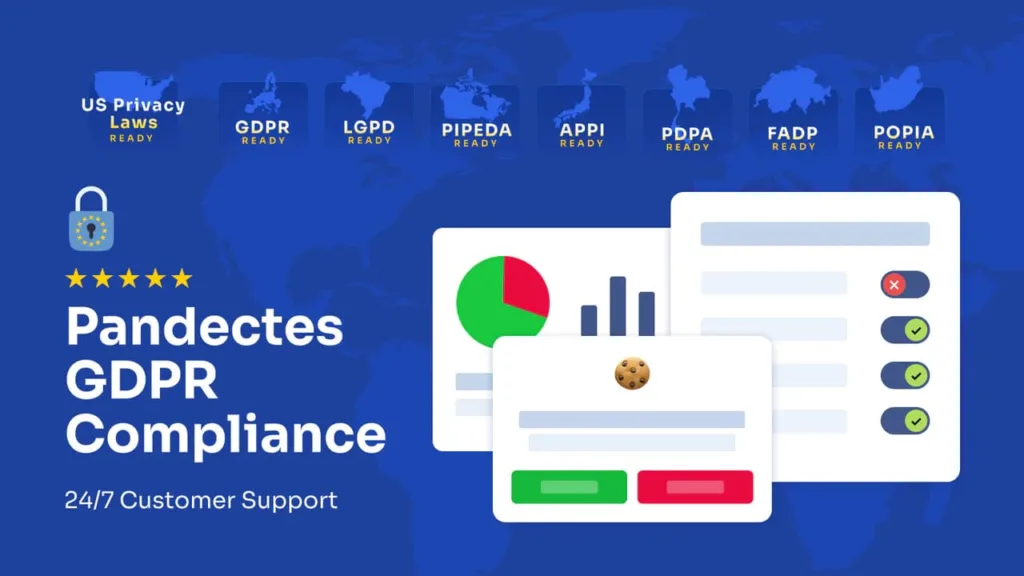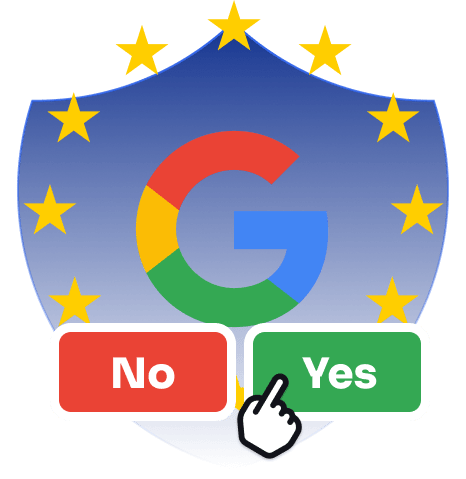Introduction
In the European Economic Area (EEA), the General Data Protection Regulation (GDPR) has significantly shifted how businesses collect and process user data, particularly in online advertising. As part of its efforts to comply with GDPR, Google has introduced the EU User Consent Policy that outlines the requirements for obtaining user consent for using their personal data. This policy has become a crucial aspect of data protection and privacy for businesses that use Google services.
It provides a clear framework for businesses to follow while collecting and managing user data, ensuring that they comply with GDPR guidelines. Understanding the nuances of the Google EU User Consent Policy is essential for businesses that rely on Google services for their advertising and data management needs. By adhering to the policy’s guidelines, businesses can build trust with their users by demonstrating their commitment to protecting their privacy and data.
Overview of EU user consent policy
Google has implemented a policy prioritizes obtaining explicit and informed consent from end users before processing their personal data. This policy applies to website operators, app developers, and advertisers using Google products within the European Economic Area (EEA). To ensure transparency in data practices, Google requires a clear and understandable consent notice to be displayed on websites and apps.
This notice must provide detailed information on the types of personal data that will be collected, how it will be used, who will have access to it, and how long it will be retained. Additionally, users must be allowed to opt-out of data collection and processing. By implementing this policy, Google aims to promote user privacy and protect their personal data from unauthorized access or misuse.
Consent Management Platforms (CMPs)
Businesses frequently employ Consent Management Platforms (CMPs) to comply with the Google framework. These platforms are designed to simplify the process of collecting user consent, ensuring that all data processing activities are carried out under the regulations set forth by Google.

One of the key benefits of CMPs is that they provide a user-friendly interface for presenting consent notices. This makes it easier for users to understand the information being presented to them and to make an informed decision about whether to opt-in or opt-out of data processing activities. By using a CMP, such as the Pandectes GDPR Compliance app for Shopify stores, businesses can ensure that they are fully compliant with Google’s guidelines and that they are respecting the privacy rights of their users.
Role of ad technology providers
In the digital advertising ecosystem, ad technology providers are important in serving targeted and personalized ads to users. However, to do so, they must obtain explicit consent from users for accessing and utilizing their data. One such prominent advertising product is Google Adsense, which has a strict policy that requires publishers to obtain user consent before using their services.
This consent ensures that users know how their data is being used and can opt-out if they so choose. By adhering to such policies, ad technology providers can maintain transparency and build trust with users, which is crucial for the sustainable growth of the digital advertising industry.

Informed users and consent validation
Users must be informed about these practices as businesses continue to collect and process personal data. Consent notices play a vital role in this process, as they provide users with information about the data that is being collected and how it will be used. To ensure that these notices are effective, businesses must ensure that they are easily readable and provide clear instructions on the data collection methods.
Google recognizes the importance of transparency and consent in data processing and encourages businesses to use the Transparency and Consent Framework. This framework provides a standard set of guidelines for businesses to follow when collecting and processing personal data. By adhering to these guidelines, businesses can ensure that their data processing practices are fair, transparent, and compliant with relevant regulations.
Ad Manager and consent banners
Google’s Ad Manager is a powerful platform providing publishers with comprehensive tools to manage their ad inventory and maximize revenue. However, publishers using Ad Manager must implement consent banners to comply with various privacy regulations. These banners are designed to ensure that users are adequately informed about the use of their data and provide explicit consent before personalized ads are served to them.
The consent banners typically contain information about the types of data that will be collected, how it will be used, and who it will be shared with. Users may also be allowed to opt-out of personalized ads altogether if they so choose.
Compliance with these regulations is critical for publishers to avoid violations and penalties, which can be significant. Therefore, it is essential for publishers using Ad Manager to ensure that their consent banners are properly implemented and provide users with clear and concise information about their data privacy rights.
Local storage and cookies consent
In accordance with GDPR regulations, websites and apps are required to obtain user consent before utilizing local storage and cookies for data storage or retrieval. This policy ensures that users have complete control over their data and privacy. Websites and apps commonly use local storage and cookies to improve user experience, personalize content, and collect analytics data.
However, without user consent, these technologies can potentially compromise user privacy and security. Therefore, websites and apps need to abide by this policy and obtain explicit consent from users before employing local storage and cookies.
Google Analytics advertising features
For businesses that use Google Analytics to gain insights into their website or app performance, it is essential to obtain explicit user consent before using the Advertising Features offered by Google Analytics. These features allow businesses to collect user data for ad targeting purposes, such as remarketing, demographics, and interest reporting. However, collecting user data for advertising purposes requires consent from the user before their data is collected and used.
As a responsible business, it is imperative to obtain consent from users clearly and transparently. This means informing users of the purpose of data collection and providing them with the option to opt-out of data collection for advertising purposes. Additionally, it is crucial to ensure that data privacy is always protected. Businesses should take appropriate measures to safeguard user data, such as implementing data encryption, user authentication, and access control mechanisms.
In summary, businesses that use Google Analytics Advertising Features must be transparent about data collection and obtain explicit user consent. This approach ensures compliance with data privacy regulations and builds trust with users by demonstrating a commitment to protecting their privacy.

Mobile apps and consent
According to the EU User Consent Policy, mobile apps must comply with specific guidelines. To ensure compliance, developers need to integrate consent mechanisms within their apps, informing users about any data processing activities.
These mechanisms should ensure that users are fully aware of what data is being collected and how it will be used and that they are given the option to grant or deny permission for such activities. This enables users to make informed decisions about their data privacy and exercise control over their personal information.
Consent revocation and user rights
According to the General Data Protection Regulation (GDPR), end users can withdraw their consent anytime. This means businesses must provide a clear and easy-to-follow process for users to revoke their consent to collect, process, and store their personal data. It is the responsibility of businesses to respect the privacy choices and rights of users, including their right to withdraw consent.
This process should not impose any additional barriers or burdens on the user, and businesses must take the necessary steps to ensure that the user’s data is fully deleted or anonymized upon withdrawal of consent. Failure to comply with GDPR regulations regarding consent revocation can result in significant legal and financial consequences for businesses.
Digital advertising landscape
The digital advertising landscape has recently undergone significant changes due to the EU User Consent Policy. This policy mandates that advertisers, publishers, and ad tech providers collaborate to establish and implement proper consent mechanisms that promote a privacy-centric advertising environment.
To comply with the policy, advertisers must ensure that they obtain explicit consent from users before collecting or using their personal data for targeted advertising purposes. Publishers must also ensure that their websites and mobile apps display clear and concise information about the collected data types and how they will be used.
Ad tech providers, on the other hand, must ensure that they provide advertisers and publishers with the necessary tools and resources to obtain and manage consent effectively. Failure to comply with the EU User Consent Policy may result in hefty fines and penalties, making it imperative for all stakeholders to work together to ensure proper compliance.
Geographical considerations and EU member states
To ensure data protection for end users in the European Economic Area (EEA), businesses must consider the region’s specific geographical considerations. This means that data protection practices must be tailored to comply with the policies and regulations of the individual EU member states where the data is being stored or processed.
By doing so, businesses can ensure a comprehensive adherence to data protection standards and avoid any potential legal or regulatory issues. Businesses need to stay up-to-date with any changes or updates to these regulations to maintain compliance and protect their users’ privacy.

Influence on ad selection and serving
The selection and serving of advertisements are significantly influenced by user consent. Advertisers are only able to serve personalized ads if they have obtained explicit consent from the user. This ensures that users have complete control over the type of ads that they come across. The need for user consent is based on data privacy regulations and policies that are in place to protect users’ personal information.
By obtaining explicit consent, advertisers can provide targeted and relevant ads to users while still respecting their privacy. The user’s ability to control the type of ads they encounter is a crucial aspect of their online experience. It helps to create a more positive relationship between users and advertisers.
Third-party control and requirements
The policy that governs user privacy places the responsibility of obtaining consent on third parties, such as ad technology providers and other entities in the advertising ecosystem. These third parties must ensure that they align with the policy requirements and contribute to a collective effort to protect user privacy. This means they must be transparent with users about the data they collect, how they use it, and with whom they share it.
Furthermore, these third parties must obtain explicit user consent before collecting and processing their data. Doing so helps ensure that users have control over their personal information and are aware of how it is used by various entities in the advertising ecosystem.
Compliance challenges and solutions
Businesses operating in the European Union (EU) must comply with the EU User Consent Policy, which mandates that website visitors must be informed about the use of cookies and other tracking technologies and be given the option to provide or withhold consent for such usage. Implementing and maintaining compliance with this policy can be challenging for businesses, especially those operating on a large scale or across multiple jurisdictions.
However, these challenges can be mitigated by adopting robust consent management strategies, such as implementing clear and concise consent notices, providing granular options for consent, and maintaining detailed records of consent. It is also crucial for businesses to stay updated on policy changes and best practices in consent management, as non-compliance can result in significant penalties and reputational damage. By prioritizing compliance and investing in effective consent management strategies, businesses can meet legal requirements, build trust with their customers, and enhance their overall user experience.
Conclusion
Businesses operating within the European Economic Area (EEA) must thoroughly understand the Google EU User Consent Policy. Adhering to this policy ensures compliance with the General Data Protection Regulation (GDPR) and promotes a transparent and privacy-focused digital environment. Businesses must make commercially reasonable efforts to obtain valid consent from users, respect their privacy rights, and contribute to a responsible data processing ecosystem.
In order to achieve this, businesses must implement effective measures such as providing clear and concise information about data collection, processing, and usage, obtaining explicit consent, and allowing users to revoke consent at any time. By following these guidelines, businesses can establish a trustworthy relationship with their users, build a positive brand image, and enhance their competitive advantage in the market.







